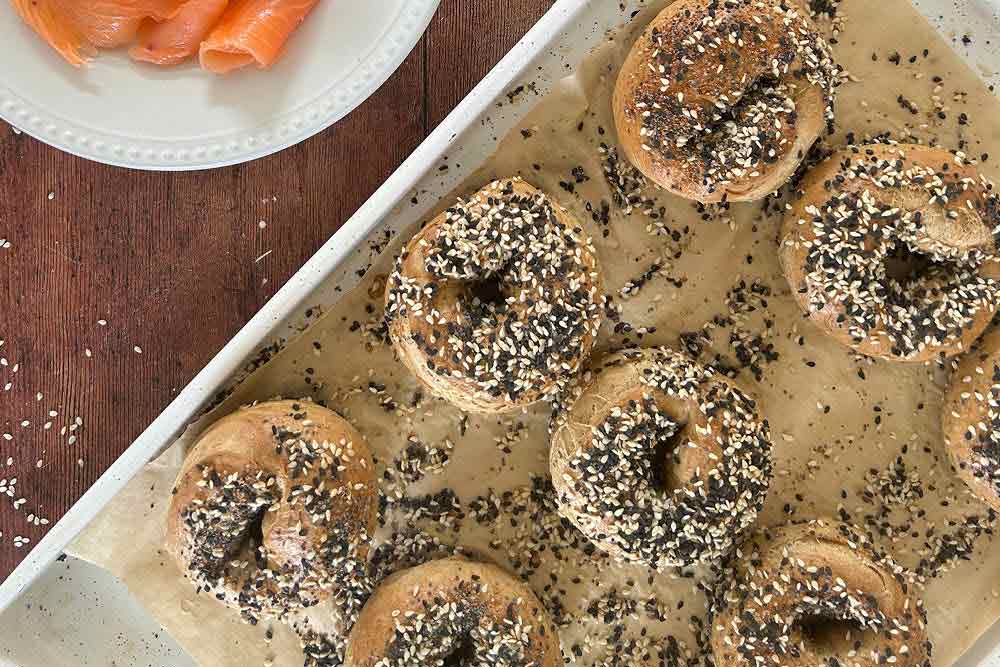
When the sun’s out, the last thing you want to be doing is faffing about with fiddly food. That’s where these easy savoury bakes come in. They’re relaxed, reliable and gloriously satisfying – the sort of thing you can knock up in the morning, take on a picnic or serve up in the garden with minimal effort and maximum reward.
There’s something inherently summery about baking that doesn’t demand perfection. Think golden brioche buns, ready to be piled high with whatever’s fresh from the BBQ. Or a batch of everything bagels, chewy, salty, crisp on the outside – ideal for stuffing with cold ham or cream cheese and tomato. And then, of course, there are sausage rolls – but not just any sausage rolls. These ones come with the genius addition of bacon, giving you all the joy of pigs in blankets, but wrapped in flaky, buttery pastry and best eaten warm from the oven with a blob of mustard on the side.
All the recipes come from Matthews Cotswold Flour, Britain’s leading producer of regeneratively farmed flours. With over 100 varieties in their range and an online Baking Club to support keen bakers, they’re serious about good ingredients – and it shows. Whether you’re a seasoned pastry pro or just dipping your toe into savoury baking, these recipes are easy to follow and deliver every time.
So roll up your sleeves, preheat the oven and get stuck in – this is summer baking at its most deliciously low-effort.
Easy brioche slider buns
Makes: 30-40 sliders
Ingredients:
100g milk
110ml water
7g dried yeast (1 sachet)
80g butter (unsalted, at room temperature)
2 eggs (plus one at the end for glazing)
3 tbsp sugar
Method:
1. In the bowl of a stand mixer fitted with a dough hook, add all of your ingredients for the brioche dough, but keep the butter back.
2. Set the mixer going on a slow speed for 5 minutes to make sure all ingredients are incorporated.
3. Turn the mixer up to a medium fast speed and let it run for a further 8 minutes – adding the butter in chunks after 2 minutes. The dough should be silky and shiny after this time, and it should be pulling itself away from the bowl nicely.
4. Pop the dough in a bowl and cover with clingfilm before leaving to rise for at least an hour, until doubled in size – this may take longer depending on the temperature of your house, don’t panic if it does!
5. Once the dough has doubled in size, turn it out onto a lightly floured surface and gently flatten it out with your hands.
6. Use a sharp knife or dough scraper to divide the dough into portions – you want them to be no bigger than about a tablespoon of dough. If you do wish to weigh these, I like to aim for 20g per portion, but these can be larger if you wish.
7. Use the heel of your hand to roll these across the counter to make a smooth ball. The rolling motion is to tuck the rough edges underneath the ball.
8. Place them on a lined baking tray and give each plenty of space to rise so they don’t batch together in baking – I sometimes like to use a bun tin for these to make sure they’re absolutely perfect. Cover the trays lightly with cling film and leave to rise again for another 45 minutes. Preheat the oven to 200C (180C fan).
9. Use your finger or a pastry brush to glaze the sliders with a little beaten egg or milk, then bake for 15-20 minutes or until well risen and golden brown.
10. Cool on a wire rack and fill with your favourite mini fillings before serving.
Everything bagels

Makes: 12 smaller size bagels
Ingredients:
For the everything bagels:
450g bread flour
50g dark rye or organic dark rye
7g dried yeast (1 sachet)
1 tbsp black treacle
8g salt
1 tbsp oil or butter
300ml lukewarm water
For the everything bagel seasoning:
4 tbsp poppy seeds
2 tbsp sesame seeds
2 tsbp black sesame seeds
3 tsp salt (fine salt is best)
2 tbsp dried garlic
1 tsbp dried onion granules
Note: This makes a lot of everything bagel seasoning! I like to make a big batch and store it in a jar. It’s perfect for seasoning things like eggs or avocado as well, so don’t limit it just to bagels.
Method:
1. Weigh out the water, add the treacle and yeast and mix, then put to the side while you get the other ingredients ready.
2. In a stand mixer fitted with a dough hook attachment, add the flours, salt, and oil. Once the water mixture is foaming, pour that over too.
3. Mix on a slow speed for 3 minutes before turning up the speed for a further 8 minutes of mixing – the dough should be smooth and supple by this point.
4. Place in a bowl and cover – then leave to rise for 45 minutes in a warm place.
5. Line a baking sheet with paper, then sprinkle over some of your bagel seasoning. This makes sure that the bottoms are also full of flavour!
6. After the 45 minutes is up, tip your dough out onto the counter and divide into 12 even pieces. Try not to use extra flour or it will make them hard to shape.
7. Get a saucepan of water on to boil, so it’s ready as soon as you’re done shaping.
8. Use the heel of your hand to make each piece into a smooth ball, then roll it out into a sausage about the length of both your hands as you roll it. Wrap the dough once around your hand to make a circle, and continue to roll gently to seal the seam up.
9. Gently place each of the bagels into the boiling water a few at a time, and boil just until they rise up to the surface – this should only take 40 seconds or so. When you remove them from the water, place them gently onto the baking tray – right on top of all the seasoning.
10. Sprinkle with more seasoning and bake at 200 degrees Celsius (180 Fan) for 30-40 minutes, or until they’re a dark golden brown colour - enjoy with cream cheese schmear for an authentic bite!
Perfect pigs in blankets sausage rolls

Makes: 12-16 sausage rolls
Ingredients:
200g all-purpose flour
200g salted butter (diced and cool)
100g cold water
6 pork sausages (chipolatas are best, try for the best quality your budget can bear)
6 rashers of smoked streaky bacon
Method:
1. In a large bowl, gently begin rubbing the fat into the flour – you are not looking for breadcrumbs here, you just want to flatten the butter enough that it looks like big flakes in the flour.
2. Make a well in the centre of the flour and pour in 100g of cold water. Use a fork or knife to mix it in until it forms a shaggy dough.
3. Tip the dough out onto a counter and knead it gently just until it’s completely come together.
4. Roll the dough out to a rectangle of about 2cm thickness. Fold the bottom third of the dough upwards towards the middle, then the top third down on top of that. Wrap the folded dough in clingfilm and leave to chill in the fridge for 30 minutes.
5. Remove the dough from the fridge, and with the seam on the right side of you, roll the dough carefully into a rectangle of the same size as before, then repeat the folds and place it back into the fridge to rest.
6. Repeat the last step one final time before placing it into the fridge to rest again .
7. Get your other ingredients prepared by removing the casings from your sausages and cutting the rashers of bacon in half so they are a shorter length.
8. Pull the pastry from the fridge and roll it out into a larger rectangle of about a 1cm thickness. Place the rashers of bacon in a row across the pastry, starting about 5cm from the top. Follow this by placing the sausages in a line across the bacon.
9. Roll the pastry down over both the sausages and bacon, and mark where the filling stops. Leaving a “foot” of pastry of about 5cm, trim the rest off (you may have enough to repeat this process a few times, or you could make something else with the rest).
10. Use a floured fork to press down on the pastry overhang to mark it, similarly to if you were decorating the edge of a pie.
11. Use a sharp knife to cut the sausage rolls to the size you would like, and place them on a baking tray.
12. Brush the tops with an egg wash or milk, then place in the fridge for 15 minutes while the oven heats to 190C (170C fan).
13. Bake the sausage rolls for 15-20 minutes, or until golden brown and well puffed up.
14. Leave to cool slightly before tucking in!
These recipes are from Matthews Cotswold Flour, Britain’s number one artisan flour producer, leading the way in producing regeneratively farmed flours. They boast a range of over 100 varieties of flour, providing an unrivalled choice for both amateur and professional bakers and run an online Baking Club to support and encourage home bakers. For more recipes, head to cotswoldflour.com/blogs/recipes.







